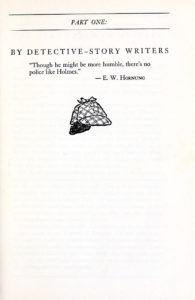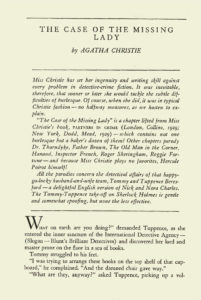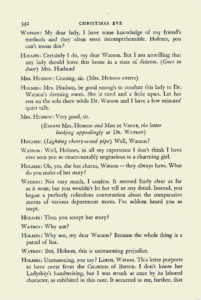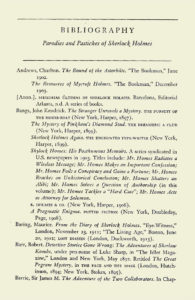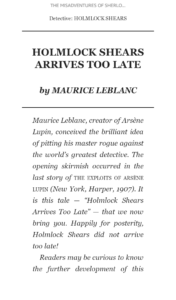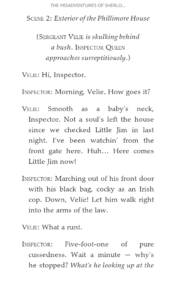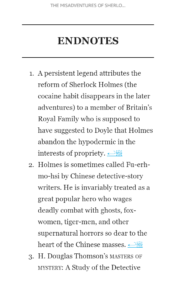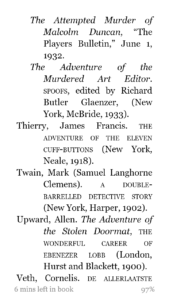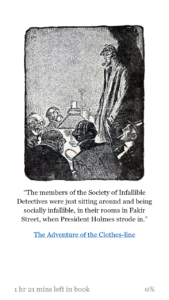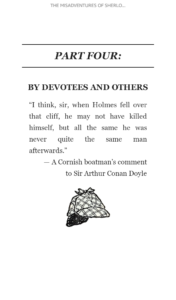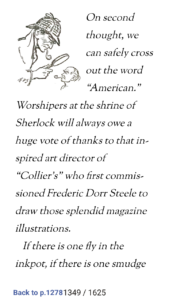Throughout January I worked, off and on, on something of a private project, to make an ebook of Ellery Queen’s long-out-of-print anthology, The Misadventures of Sherlock Holmes.
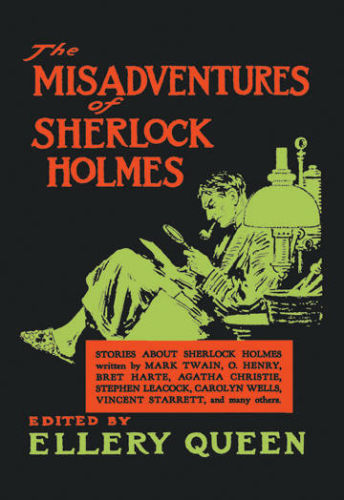 An anthology of Sherlock Holmes parodies, sprinkled with a few genuine pastiches and two play scripts, essentially a survey of non-Doyle Sherlock Holmes literature to mid-century, The Misadventures of Sherlock Holmes was published in 1944 then allowed to go out of print, due to legal threats from the Arthur Conan Doyle estate. Never reprinted — twenty-five years ago in The Game Is Afoot, which contains about a third of The Misadventures, editor Marvin Kaye says there was (then) movement toward a reprint, but nothing ever came of it — The Misadventures has been a kind of Holy Grail, something I’ve long sought (and once held in my hands, in a college library) that I’d never own. That’s not to say that one can’t find them for sale, but I have better things to do with my meagre income than to spend several hundred dollars on a rare book.
An anthology of Sherlock Holmes parodies, sprinkled with a few genuine pastiches and two play scripts, essentially a survey of non-Doyle Sherlock Holmes literature to mid-century, The Misadventures of Sherlock Holmes was published in 1944 then allowed to go out of print, due to legal threats from the Arthur Conan Doyle estate. Never reprinted — twenty-five years ago in The Game Is Afoot, which contains about a third of The Misadventures, editor Marvin Kaye says there was (then) movement toward a reprint, but nothing ever came of it — The Misadventures has been a kind of Holy Grail, something I’ve long sought (and once held in my hands, in a college library) that I’d never own. That’s not to say that one can’t find them for sale, but I have better things to do with my meagre income than to spend several hundred dollars on a rare book.
A decade ago, someone uploaded a scan of the entire book to the Internet along with a very rough OCR of the book’s text. I found it, pretty much by accident, one day, and downloaded the files, assuming they might quickly disappear. (Which they have not, but I won’t point you in their direction. They are quite easy to find.) Whereupon they languished on my hard drive for several years.
Around Christmas 2013, after reading an article about it in The Atlantic, I began to use the now-defunct ebook reader software Readmill. This line in Robinson Meyer’s article intrigued me: “I’m nearly certain it has the best digital typography among e-reading software today. On Readmill, digital books look like books, not text files foisted into an extensible reading environment.” I sideloaded the software onto my Kindle Fire tablet and quickly discovered that, yes, Readmill had great typography, and then I began thinking about what I wanted to read with it.
I’ve been making ebooks for myself since 2000, when Microsoft released the Reader ebook software. (Though the software has been long unsupported, to this day I regularly use Berling Antiqua, the font that came packaged with Reader.) One of the first things I did was to download Overdrive ReaderWorks, a software package for making the LIT files that Microsoft Reader used. Even then, twenty years ago, nascent ebooks were simply containers that contained HTML files, CSS files, and images — essentially, the components that drive the Internet to this day. When I got a Nook, I downloaded Calibre, an ebook management package that can convert ebooks from one format to another, even let you build them from scratch.
Making an ebook of The Misadventures, then, was a deeply intriguing idea.
The first thing I noticed when looking through the scanned PDF of The Misadventures of Sherlock Holmes was that it was a beautiful book. I fell in love with the typography, the heavy use of small caps, the old-style numerals.
It was a book I wanted to look at and savor, not only because of its words but because of its beauty. I wanted to recreate, as much as possible, the look and feel of the original book, and I wanted my ebook to be just as beautiful.
I worked intently for about two weeks in early 2014. I would go to the text file — which was very, very bad — and copy out a story and paste it into Notepad. Then, comparing it to a printout from the PDF, I would correct the errors and lay my HTML tags. I even created CSS code so the story introductions would be formatted correctly.
Then, in mid-January, after completing a clean-up of about a third of the book, I stopped. To this day, I don’t know why. Did I lose passion for the project? Was I overwhelmed at work? Whatever happened, my working files sat, unwanted and unloved, in a directory on my desktop, and at some point I moved them off of my desktop, out of sight and out of mind. I’d think about The Misadventures from time to time, and do nothing.
Around Christmas, I said to myself, “Dude, why don’t you finish it?” And a few days after New Year’s, I picked it up again.
I had new ideas. I’m a big fan of Standard Ebooks, a project that makes free, professional-quality ebooks from public domain texts. Their books look great, they’re coded well, the CSS produces beautiful typography. Essentially, they made exactly what I wanted my ebook of The Misadventures of Sherlock Holmes to be, so, using Calibre, I took a Standard Ebooks book apart and decided to use its code as my foundation, adding my chapters and my CSS code on top of the basic CSS typography.
I started with what I’d done six years earlier — the introduction and dozen stories I’d cleaned up — and added them to the Calibre project. Most stories started with a block at the top that indicated its detective and its narrator, side by side on the opposite sides of the page. I experimented with CSS code to make that work — I settled on using two SPANs and floating the text left or right — but most of it was fairly straightforward. The advantage to working in Calibre in this way was that, as I finished proofing and polishing a story, I could add it to the ebook file and see how it worked, building the book one story at a time.
There were challenges. Footnotes don’t work in ebooks, so I moved all of the footnotes in The Misadventures to an Endnotes section. There’s an index, which I wanted to keep, so I coded internal hyperlinks to the stories or, in some cases, endnotes that the original index would have. In so doing, I discovered one entry in the index that actually wasn’t in Ellery Queen’s manuscript, and there were two Wastonian characters that should have been in Queen’s index that weren’t. These I silently corrected.
One thing I was keen to do was to retain the illustrations by Frederic Dorr Steele. Sidney Paget is considered the definitive Sherlock Holmes artist, but I have a distinct preference for Steele.
One thing I did not do was to retain the dropcaps that led off each story. Dropcaps don’t work well in ebooks. But I did retain the way the original book began each story with a few words done in small caps.
It took about two weeks of work to complete the book. The two play scripts were probably the most difficult part of the book to format correctly. After assembling the finished book, I did a proofread on my Kindle, highlighting things that looked like they were wrong, comparing those highlights to the manuscript, and editing my files to make corrections. Doing so, I believe I’ve fixed a couple of typos from the original book. There was one howler of a fact error in a single story that I silently corrected by changing a single word, and I thought about adding one note to explain the reference to “32mos” in John Kendrick Bangs’ The Adventures of Shylock Homes, as that’s a term I don’t believe I have ever encountered (it’s an old publishing term, today we’d call it a “trade paperback”), but that I left alone.
Whether it looks the way I want it to is due to the ebook readers software, not my work. Different ebook readers implement the CSS3 spec incompletely or inconsistently. I thought the finished ebook would look fantastic in Moon+, which is considered one of the best ebook reader apps out there, but there were parts of my CSS that it simply ignored in favor of its own way of formatting. Small caps and old-style numerals are, shall we say, edge cases that aren’t always implemented. I tried various epub plugins for Chrome in Vivaldi and got exactly what I wanted in a desktop browser. On a phone or tablet, Gitden Reader did the best, but it’s not a particularly user-friendly piece of software.
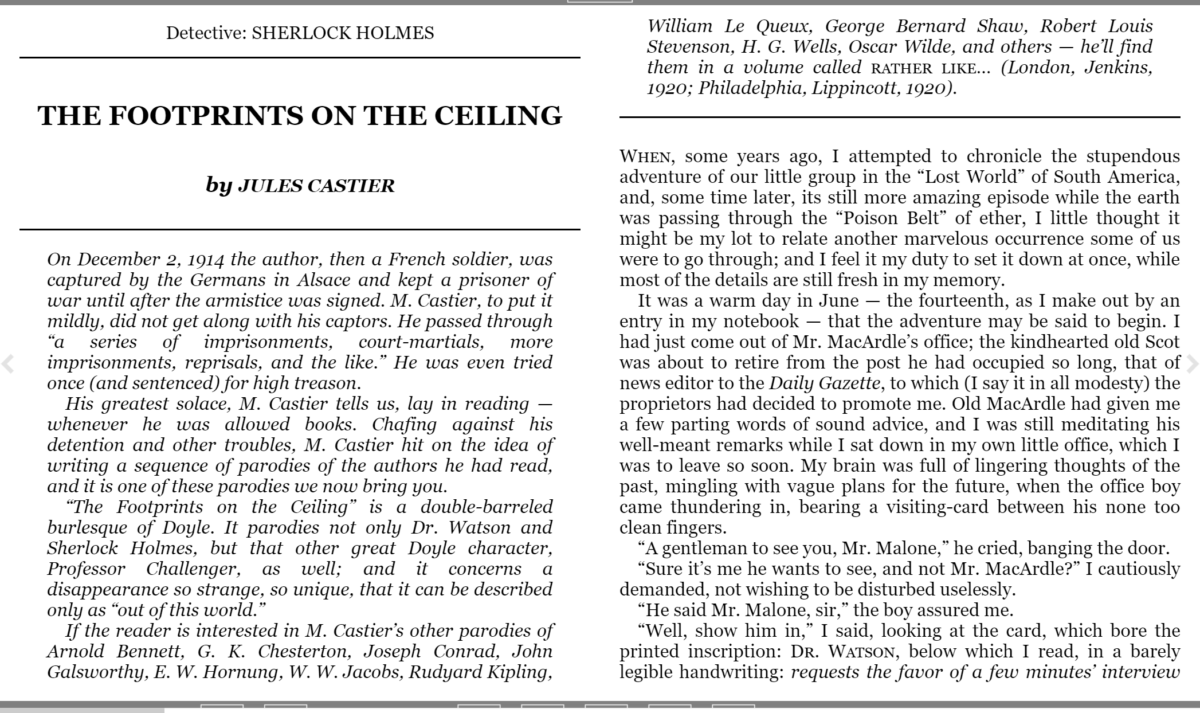
Readmill did well with it. I discovered that I had implemented the detective/narrator block leading off each story badly. When I replaced the SPAN tags with P tags and a display: inline; rule in the CSS, they formatted correctly. But it can’t do the small caps or old-style numerals at all. Six years ago I might have driven myself mad trying to figure out why it wasn’t doing those things. Now I understand that it’s not Readmill, it’s simply how ebook readers work.
My decade-old Nook Simple Touch, poor thing, did better than I thought it would. The Nook has a well-known problem with centering images — it can’t handle the simple CSS rule margin-left: auto; margin-right: auto; display: block; at all — nor does it do the small caps and the old-style numerals.
My Kindle Fire and the Kindle app on my phone do very well with it, as you can see from the screenshots above. It does the small caps correctly, but for old-style numerals I need to use the Georgia font instead of my preferred Palatino.
It’s unfortunate that The Misadventures has been out of print for the last seventy-five years as it’s rather entertaining and provides a nice overview of the state of Sherlock Holmes literature at the time of its publication. There’s an Arsène Lupin story (“Holmlock Shears Arrives Too Late,” the first meeting of Lupin and “Shears”/”Sholmes,” which you can read in Standard Ebooks’ Arsène Lupin collection), Vincent Starrett’s classic “The Unique Hamlet” makes an appearance, as does Mark Twain’s A Double-Barrelled Detective Story. There’s a Solar Pons story from August Derleth, there’s a story that a serious Raffles story and a Holmes parody at the same time, there are stories from Anthony Boucher and Manly Wade Wellman that place Holmes in a World War II setting, there’s even two stories about Sherlock Holmes’ children, one played for humor (his three year-old son is even better at deduction than his father, but with the maturity and discretion of a three year-old), one a serious mystery (with a Joan Watson, no less!). Many of the pieces are parodies and burlesques that poke fun, sometimes gently, sometimes savagely, on Sherlock Holmes. The script from The Adventures of Ellery Queen radio show with a Sherlock Holmes theme is really the only self-indulgent inclusion, but the story introductions by the Queen gestalt are fascinating, warm, and chatty in their own right. It’s a nice collection, one that, if someone brought back into print, I’d happily add to my bookshelf.
In spite of the limitations of the ebook reader software, I achieved what I set out to do. I created an ebook of Ellery Queen’s The Misadventures of Sherlock Holmes, one that looks professionally produced and maintains, as much as possible, the formatting of the book as originally published in 1944. Sometimes I will open the book on my Kindle, just to flip through and look at it. It’s a good looking book, an attractive book, and I’m glad I spent the time, picked up the project again, and finished it.

